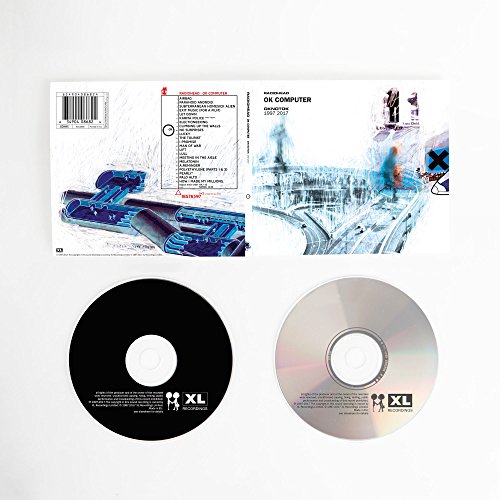
Radiohead
OK Computer: OKNOTOK 1997-2017
Release Date: Jun 23, 2017
Genre(s): Pop/Rock
Record label: XL
Music Critic Score
How the Music Critic Score works
Buy OK Computer: OKNOTOK 1997-2017 from Amazon
Album Review: OK Computer: OKNOTOK 1997-2017 by Radiohead
Phenomenal, Based on 10 Critics
Based on rating 10/10
It's nowhere to be found on this twentieth anniversary reissue of Radiohead 's third album. OKNOTOK lends us an interesting, but ultimately incidental, new perspective through its inclusion of three previously unreleased tracks, but as far back as 1998, there was Meeting People Is Easy, the documentary that followed the band over the course of their tour for the LP. Unsurprisingly, given the band's appetite for the willfully abstruse, it's a long way from being an access-all-areas affair; in fact, given how excruciatingly uncomfortable they found the intensity of the spotlight at the time, it's astonishing they signed off on such a film at all.
Based on rating 5/5
Great records can conjure the illusion of being tailored specifically to whatever era the listener is in. Declaring "Karma police, arrest this man!" alongside couplets like "Ambition makes you look pretty ugly/Kicking, squealing Gucci little piggy," as transcendent melodies vie with outbursts of anxiety, depression and technological hate-fucking, OK Computer sounds pretty relevant right about now. Over the past 20 years, it always has.
Based on rating 10/10
I am now reaching advanced enough years that twentieth anniversary reissues of records are now all of stuff that came out when I was a teenager. Which is depressing, and a bit weird, and also I wonder how accurate my memory is. Still, to this thirtysomething perhaps the most remarkable thing about Radiohead's OK Computer is what a unifying record it was and remains.
Based on rating 5/5
T he popular perception of Radiohead is that, after peaking with OK Computer - an hour-long howl against the rise of the machines - the band ironically shunned guitars in favour of glitchy electronics. Two decades later, this reissue (effectively 2008's Collector's Edition plus three excellent unreleased songs) proves that Radiohead's reputation derives from their music's depthless humanity, not its instrumentation: the impotent fury of Exit Music and Karma Police, Let Down's euphoric ennui, the numbed night terrors of Climbing Up the Walls… The world's greatest rock band, pushing the limits of what they, or anyone else, could achieve. .
Based on rating A+
Radiohead's success is a moving target, though for most, the pinpoint always lands in OK Computer. Their third album felt revolutionary in 1997 and continues to feel so decades later. It's gone on to be preserved as such; it's been sitting in the Library of Congress as a "culturally, historically, or aesthetically significant" artifact for two years now.
Based on rating 5/5
I n 1996, during sessions for their third album, Radiohead recorded a track called Lift. Like much of their new material, it had first been performed during a disastrous American tour that same year, supporting Alanis Morissette. But unlike the other new songs Radiohead had played, Lift had gone down well. Listening to it on the 20th anniversary reissue of OK Computer, you can see why: it is blessed with an immense, air-punch-inducing chorus.
Based on rating 10/10
As they regrouped to figure out what their third album might be, Radiohead faced, if not a crossroads, then an unusually open stretch of road. They had toured with Alanis Morissette in support of their second LP, 1995's The Bends. They had appeared, pale and blinking, before tanned and greased hordes on "MTV Spring Break," wailing the chorus to a massive runaway hit that was now fading in their rearview.
Based on rating 4/5
An epochal album that called time on the narrow colloquial nostalgia of Britpop, sold over eight million copies and transformed Radiohead into global angst-rock superstars, OK Computer turns 20 as both revered critical milestone and oft-mocked symbol of pretentious overreach. Digitally remastered from original analogue master tapes and reissued with new material, including three previously unreleased tracks and reams of extra artwork, Radiohead's compendium of pre-millennial tension is not quite the flawless masterpiece of fond folklore, but it holds up extremely well. It still sounds rich, beautiful, mysterious, romantic, anguished, baroque and thrillingly experimental.
Based on rating 4/5
Remember when artists were nurtured and given time to find some kind of defining voice? Who would have thought from their earliest efforts that, come their third album, Radiohead would be taking rock music to new places and reluctantly defining an era? It marks the point when they both expanded their musical horizons way beyond the student union indie of their formative years, and started creating something that felt altogether more insular. There's a weed-heavy, humid atmosphere to songs like Subterranean Homesick Alien and Climbing Up The Walls that suggested they were finding more in common with the likes of Massive Attack and Portishead than the Britpop they were lumped in with. It was the album when bassist Colin Greenwood and drummer Phil Selway's influence came to the fore: one for the heads, as they say.
Opinion: Fantastic
There was almost another album's worth of material behind Radiohead's most significant album OK Computer , and uniformly, it is good. One might expect that as many strong ideas were behind one of the most meticulously crafted and complex rock records of all time. Of Radiohead's fairly rich back catalogue–from the glitchy Com Lag outtakes on the denser Hail to the Thief to the wayward experiments that pad out the Amnesiac "Collector's Edition" – their 1997 leftovers are perhaps their most beloved among Radiohead devotees.
'OK Computer: OKNOTOK 1997-2017'
is available now

